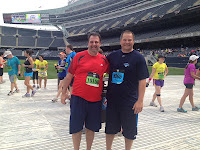 |
| Me running on treadmill |
- Not weightlifting for 6 years is probably not good. Not so much when I did my lower body workout, but Wednesday's upper body workout really killed.
- Even when you pay attention to how to use the machines, you can still forget how to use them and get frustrated that you look silly. Need to ask for a reminder about a couple this week.
- I really don't like running on the treadmill. It is not so much the feeling that I am putting out all this effort and going nowhere, but rather that it is really hard to get lost in my run when I am on the treadmill. The scenery never changes, in fact most often I am looking in a mirror at me. The pace never lets up, unless I agree to give in an lower it. Time seems to creep slowly by, unless like this week the machine throws me for a loop and is programmed to change speeds at set intervals.
Monday I ran for 20 minutes at 6.1 mph (9:50 pace). It was the fastest I had run all summer by over a minute and I was able to make 20 minutes. The best part was that twice during my run, after each 5 minutes of running, I had a 1.5 minute burst where the pace increased to 6.4 mph (9:10 pace) automatically and then dropped down again. I actually found myself looking forward to these moments of a quick burst of speed. It made the run go much smoother and seem to not last as long.
With this in mind, I was really looking forward to my run on Wednesday. Until it started and the first change of pace came. It was then I discovered, I really hate running on a treadmill on an incline. Instead of a change of pace, it was a change in incline. I went from 1% incline to a 3% incline, and then to a 4% incline, before settling back down to 1% for the final 9 minutes, of which I only lasted 4 until I had to walk (I did finish by running the last 2.5 minutes when they came in to take my picture and pride kicked in).
I also found out that sometimes running while looking at yourself run is not such a bad thing. As I was running on Wednesday I looked at my legs and noticed that my left calve looked larger than my right calve. I thought it might just be me being tired, or maybe the angle I was looking at in the mirror, but I filed it away in my head. On Friday I looked again, and find that no I was right my left calve was definitely larger than my right one. With this in mind I asked our athletic trainer at PHS Ryan Carrol what he thought. He agreed, then after a few more questions he suggested I speak with my doctor, Dr. David Darr, and see what he thought. I had an Ultra Sound on Monday, waiting to hear what they find, but without the Journey to Wellness I would not have thought much of the slight pain in my left calve and not gotten it checked out, so I am learning more each week about my own state of health.











